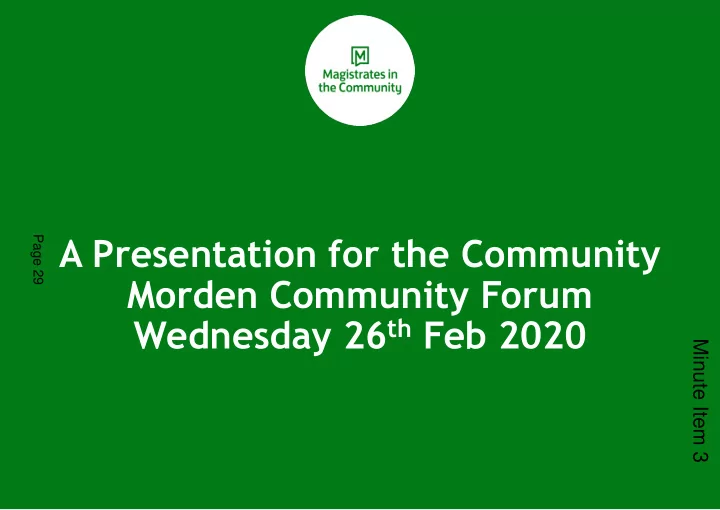

A Presentation for the Community Page 29 Morden Community Forum Wednesday 26 th Feb 2020 Minute Item 3
The History of The Magistracy Abolition of the Justice death penalty The Murder of Keepers of of the Peasants Civil for petty Black Death Thomas Becket the Peace Peace Revolt War offences 1348 1361 1381 1600s 1823 1170 1195 Appointment system First World War – Opening of the Petty Sessional challenged. attitudes towards Women's’ Suffrage first passenger Divisions – JPs no women begin to Page 30 turned militant. railway in longer need to be change due to their Britain landowners Advisory Committees set up role in the war effort 1825 1828 1906 1914-18 Courts Act. Justice of the Peace Major changes to administration of the Act . 31 Dec – courts. Magistrates appointed first woman JP Six women Second by application, Criminal Justice Act. appointed appointed World War not invitation Sentencing changes 1919 1920 1939-45 1979 2003
The Court System in England and Wales Page 31
The difference between Magistrates’ Court and Crown Court? • Magistrates – hear the evidence and decide innocence or guilt • Magistrates – also decide sentence when guilty Page 32 • Crown Court – Jury of 12 ‘peers’ hears the evidence and decides innocence or guilt • Crown Court – Judge decides sentence
What cases are dealt with in the Magistrates’ Court? ‐ All criminal cases start in the magistrates’ court ‐ Around 90% of cases are dealt Page 33 with fully in the magistrates’ court Crown Court Magistrates’ Court
Who are Magistrates? • Magistrates are members of a community entrusted to deal with those cases that are brought before them in a magistrates’ court. • They come from a wide range of backgrounds, cultures and occupations and are representative of the communities they Page 34 serve. • There are currently about 16,000 magistrates serving in the courts in England and Wales. • Some Magistrates are specially trained to hear cases in Youth Court and in Family court.
Youth Court • For 10-17 year olds – in a less formal setting • Sentences purely aimed at changing behaviour Page 35 and supporting the welfare of the young person • Parents are often involved in the outcome
The Family Court is not a criminal court. It is not open to the public to attend. Cases can last 3-4 days. • Deals with: • Protection of children Page 36 • Contact • Adoption • Parental responsibility
Inside the Magistrates’ Court Magistrates usually sit on a bench of three people – all volunteers Page 37 A judgement can also be made by a District Judge sitting alone
Examples of crimes that are dealt with in the Magistrates’ Court ? • Burglary • Assault • Motoring offences e.g. careless/drink or drug driving, taking without owners consent (TWOC) • Theft e.g. shoplifting. Page 38 • Benefit fraud Also • Warrants for the police and utility companies • Fare evasion • Council Tax • Environmental and Trading issues • Dangerous dogs • Animal cruelty
From Crime to Court Arrest Crime made committed Page 39 Sent to Taken to court for custody plea to be suite and taken charged
Bail Decisions Page 40
Purpose of Sentence • Punishment • Reduction in crime • Deterrence • Reform and rehabilitation • Protection of the public Page 41 • Reparation • Can be all or some of these Sentencing Guidelines https://www.sentencingc ouncil.org.uk/the- magistrates-court- sentencing-guidelines/
Deciding on Sentence 1: The Offence Less Serious More Serious • No damage/injury • Vulnerable victim • Impulsive • Weapon • Low value • Group action • Racially aggravated • Breach of trust Page 42 Increasing seriousness Community punishment Prison Discharge Fine order
Deciding on Sentence 2: The Offender Less Serious More Serious • Remorse • Previous record • Co-operation • Lack of remorse • Prompt guilty plea • Lack of response to • Good character previous court order • Offence on bail/licence Page 43 If we need to know more – ask probation Community punishment Prison Discharge Fine order
Sentences Conditional Fine discharge Page 44 Prison or Community curfew sentence order
Community Sentence Requirements • Unpaid work (40 – 300 Hrs) • Residence • Rehabilitation Activity (10-60 • Mental health treatment* days) • Drug rehabilitation* • Accredited Programme • Alcohol treatment* (e.g. Thinking Skills) • Attendance centre Page 45 • Prohibited activity (if under age 25) • Curfew * requires offender agreement • Exclusion • Foreign travel prohibition
Consequences after Court Loss of job Visa and opportunities travel restrictions Criminal record Page 46 Loss of trust by friends and family Public Higher shame, for insurance you and premiums family
Thank you! Page 47
This page is intentionally left blank
Recommend
More recommend